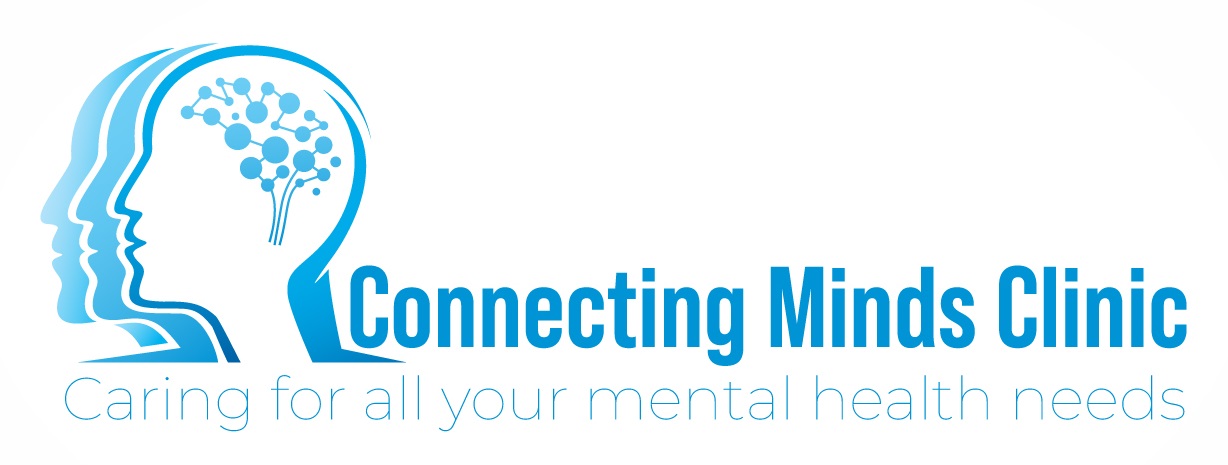Connecting Minds Clinic prioritizes a safe environment to meet the mental health needs for clients and their families. Our team specializes in child, adolescent, adults, couples & family therapy. Our team speak many languages including English, Mandarin, Cantonese and Bahasa Indonesia. We have both male and female doctors.

At Connecting Minds Clinic, we believe in the early detection of mental health needs and supporting clients through their interpersonal relationship, working with clients within the family domain towards an effective, healthy communication that fosters trust and recovery of the client not only from a mental health perspective but also towards reaching their potential in the friendship, education and employment domain.

In light of COVID-19 concerns we are taking the following precautions to help keep everyone safe:
If you choose to come in, you are required to comply with the clinic’s procedures:
– Must use face mask & hand sanitizer (provided).
– Must keep 1.5m apart from other individuals.
If you or members of your family have:
fever, cold symptoms or cough or have been in contact with someone who has COVID-19 please kindly notify our clinic and the appointment will be postponed or you will be offered a telehealth appointment.
Connecting Minds Clinic Expertise

Child & Adolescent Therapy
Our doctors are able to help young children and teens with emotional and psychological distress, such as, bullying, refusal to attend school, self hurt, insomnia, eating disorders, ADHD, OCD, etc.
Adults & Couples Therapy
Our doctors are able to help adults with depression, work stress, insomnia, suicidal thoughts, personality disorders, obsessive compulsive disorder, post traumatic stress order, grief, etc.
Family & Group Therapy
Our doctors are able to help with family conflict, migrant metal health, culture integration, primary caregiver burn out, family and life issues, etc.
Services We Provide At Connecting Minds Clinic
Poor Mental Health – Depression, Suicidal, Emotional Instability
Depression (major depressive disorder) is a common and serious medical illness that negatively affects how you feel, the way you think and how you act. Fortunately, it is also treatable. Depression causes feelings of sadness and/or a loss of interest in activities you once enjoyed. It can lead to a variety of emotional and physical problems and can decrease your ability to function at work and at home.
Depression symptoms can vary from mild to severe and can include:
- Feeling sad or having a depressed mood
- Loss of interest or pleasure in activities once enjoyed
- Changes in appetite — weight loss or gain unrelated to dieting
- Trouble sleeping or sleeping too much
- Loss of energy or increased fatigue
- Increase in purposeless physical activity (e.g., inability to sit still, pacing, handwringing) or slowed movements or speech (these actions must be severe enough to be observable by others)
- Feeling worthless or guilty
- Difficulty thinking, concentrating or making decisions
- Thoughts of death or suicide
Anxiety disorders
Anxiety disorders is a group of mental health disorders that includes generalised anxiety disorders, social phobias, specific phobias (for example, agoraphobia and claustrophobia), panic disorders, obsessive compulsive disorder (OCD) and post-traumatic stress disorder. Untreated, anxiety disorders can lead to significant impairment on people’s daily lives.
Bipolar affective disorder
Bipolar affective disorder is a type of mood disorder, previously referred to as ‘manic depression’. A person with bipolar disorder experiences episodes of mania (elation) and depression. The person may or may not experience psychotic symptoms. The exact cause is unknown, but a genetic predisposition has been clearly established. Environmental stressors can also trigger episodes of this mental illness.
Depression
Depression is a mood disorder characterised by lowering of mood, loss of interest and enjoyment, and reduced energy. It is not just feeling sad. There are different types and symptoms of depression. There are varying levels of severity and symptoms related to depression. Symptoms of depression can lead to increased risk of suicidal thoughts or behaviours.
Dissociation and dissociative disorders
Dissociation is a mental process where a person disconnects from their thoughts, feelings, memories or sense of identity. Dissociative disorders include dissociative amnesia, dissociative fugue, depersonalisation disorder and dissociative identity disorder.
Eating disorders
Eating disorders include anorexia, bulimia nervosa and other binge eating disorders. Eating disorders affect females and males and can have serious psychological and physical consequences.
Obsessive compulsive disorder
Obsessive compulsive disorder (OCD) is an anxiety disorder. Obsessions are recurrent thoughts, images or impulses that are intrusive and unwanted. Compulsions are time-consuming and distressing repetitive rituals. Ttreatments include cognitive behaviour therapy (CBT), and medications
Paranoia
Paranoia is the irrational and persistent feeling that people are ‘out to get you’. Paranoia may be a symptom of conditions including paranoid personality disorder, delusional (paranoid) disorder and schizophrenia. Treatment for paranoiainclude medications and psychological support.
Post-traumatic stress disorder
Post-traumatic stress disorder (PTSD) is a mental health condition that can develop as a response to people who have experienced any traumatic event. This can be a car or other serious accident, physical or sexual assault, war-related events or torture, or natural disasters such as bushfires or floods.
Psychosis
People affected by psychosis can experience delusions, hallucinations and confused thinking.. Psychosis can occur in a number of mental illnesses, including drug-induced psychosis, schizophrenia and mood disorders. Medication and psychological support can relieve, or even eliminate, psychotic symptoms.
Schizophrenia
Schizophrenia is a complex psychotic disorder characterised by disruptions to thinking and emotions, and a distorted perception of reality. Symptoms of schizophrenia vary widely but may include hallucinations, delusions, thought disorder, social withdrawal, lack of motivation and impaired thinking and memory. People with schizophrenia have a high risk of suicide. Schizophrenia is not a split personality.
Mental disorders among children are described as serious changes in the way children typically learn, behave, or handle their emotions, which cause distress and problems getting through the day.
- Anxiety
- Depression
- Oppositional Defiant Disorder (ODD)
- Conduct Disorder (CD)
- Attention-Deficit/Hyperactivity Disorder (ADHD)
- Tourette Syndrome
- Obsessive-Compulsive Disorder (OCD)
- Post-traumatic Stress Disorder (PTSD)
Adult Mental Health
Mental illness is a general term for a group of illnesses that may include symptoms that can affect a person’s thinking, perceptions, mood or behaviour. Mental illness can make it difficult for someone to cope with work, relationships and other demands. The relationship between stress and mental illness is complex, but it is known that stress can worsen an episode of mental illness. Most people can manage their mental illness with medication, counselling or both.
- Anxiety disorders
- Behavioural and emotional disorders in children
- Bipolar affective disorder
- Depression
- Dissociation and dissociative disorders
- Eating disorders
- Obsessive compulsive disorder
- Paranoia
- Post-traumatic stress disorder
- Psychosis
What is Couples Therapy?
Couples therapy is a type of psychotherapy in which a therapist with clinical experience working with couples, most often a Licensed Marriage and Family Therapist (LMFT), helps two people involved in a romantic relationship gain insight into their relationship, resolve conflict and improve relationship satisfaction utilizing a variety of therapeutic interventions. Although the practice of couples therapy may vary depending on the therapist’s theoretical orientation, all couples therapy tends to involve the following general elements:
- A focus on a specific problem (i.e. sexual difficulties, Internet addiction, jealousy)
- Active participation on the part of the therapist in treating the relationship itself, rather than each individual separately.
- Solution-focused, change-oriented interventions early on in treatment.
- A clear establishment of treatment objectives.
Family & Group Therapy
Family conflict
Family conflict refers to active opposition between family members. Because of the nature of family relationships, it can take a wide variety of forms, including verbal, physical, sexual, financial, or psychological.
What are some symptoms of family issues?
- Anxiety or worry: You may be frequently preoccupied with concerns about your family and struggle to focus on other things.
- Sadness or depression: Feelings of tension, conflict, or disconnection from your family might make you feel sad or hopeless.
In families where there is a high level of conflict and animosity between parents, children are at a greater risk of developing emotional, social and behavioural problems, as well as difficulties with concentration and educational achievement.
What is the purpose of group psychotherapy?
Group Therapy
Group therapy helps individuals develop communication skills and socialization skills, and allows clients to learn how to express their issues and accept criticism from others. Group therapy allows individuals to develop self-awareness by listening to others with similar issues.
A Typical Group Therapy Session
Group therapy is usually led by one or two therapists trained to lead therapeutic groups. Group sizes can range from six to twelve members. While groups may be small or large, the group process may be less effective in much larger groups.
A session might begin with members of the group introducing themselves and sharing why they are in group therapy. Members might also share their experiences and progress since the last meeting. The precise manner in which the session is conducted depends largely on the goals of the group and the therapist’s style.



Why Choose Us?
We believe in not only providing our medical expertise around diagnosis of mental health conditions but also work closely with GPs, relevant specialists and allied health around ensuring you have optimal physical health. We believe in jointly providing therapy to individual clients but also working with individual clients and their families focusing on effective communication and building of trust and promoting connections in each family members towards collaborative and empathetic interaction.
Multi Language Doctors
Our team speak many languages including English, Mandarin, Cantonese and Bahasa Indonesia.
Child & teens Therapy
Our clinic is equipped with facilities that will provide excellent comfort and well being for your children.
Adults Couples &
Family Therapy
We also provide therapy services for individual adults, couples and family therapy.
Qualified Staff
Our doctors have at least 10 years of expertise in each of their fields. We have a team of both male and female doctors.
Services & Expertise
Connecting Minds Clinic specializes in Mental Health Medicine. We provide help for kids, adolescents and adults with emotional and mental instabilities. We are able to help individuals with depression, suicidal thoughts, eating disorders, anxiety, personality disorders, sleep disturbance, insomnia, emotional deregulation, poor self esteem, school refusal, hyperactivity poor attention (ADHD), stress, obsessive compulsive disorder (OCD), post traumatic stress disorder (PTSD), Grief, Bullying, Hallucination, bi-polar disorder, paranoia, schizophrenia and other mental or emotional disorders.
Make your 1st appointment with us?
Who should come?
What to bring?
What to expect?
How long will it take?
Who should come?
– FOR YOUNGER CLIENTS LIVING WITH PARENTS/CARERS
The initial appointment is with the child or adolescent and all family members if possible. If this is not possible then at a minimum one parent/carer is required to also attend. If time permits, the Clinician will also see parents/carers/siblings and the child/ adolescent separately at this appointment. For continuing appointments, further follow ups may be required with the parents, separate to the patient, or in unison. This will be determined after the first appointment.
– FOR CLIENTS LIVING INDEPENDENTLY
The initial appointment is with the patient, however if time permits and it is the desire of the patient, the Clinician will also see the parents/carers together with the patient.
What to bring?
On the 1st visit to our clinic:
- If you are seeing a psychologist, you will need a mental health care plan and a referral template to be completed by your GP.
- Medicare card
- Letters or reports that you have from other professionals who have been involved, such as a school counsellor, teacher, psychologist or pediatrician.
What to expect?
Your Psychiatrist will:
– Listen and talk about your concerns and symptoms
– Ask questions about general health
– Ask about your family history
– Often gives you a time separate from the family to discuss any issues in confidence
There will usually be a lot of questions. The long appointment gives the psychiatrist time to listen and hear your whole story.
They might also want to speak with other health professionals or members of your family.
Your psychiatrist may order some more tests to help them understand what is going on.
To get more specific information please talk to administration staff before coming in for your first session.
How long will it take?
The first appointment is usually about 75 minutes. In this appointment the clinician will do their best to understand your individual issues and concerns of your accompanying family member. Occasionally, we will need more appointments to formulate and provide the best quality care to meet your individual needs. Conditions, such as ADHD, for example may require 3-4 more sessions before the initiation of medications alongside formulating a therapy and support plan.
Get One Step Ahead of
Mental Break Down
Mental health issues often have a multirelational impact to the client, the people they interact with which include their family members, the people they work with or the school they attend.
Connecting Minds Clinic aims to work closely with the family as a system to find the most collaborative way to support the client with the mental health issue.
Below are the types of challenges we can help you with:
Depression
Emotional Instability
School Refusal
Family Conflict
Poor Self Esteem
Cultural Integration
Migrant Mental Health
Childhood Anxiety
ADHD (Hyperactivity, Poor Attention)
Post Self Esteem
Mental health
Depression
Anxiety
ADHD
OCD
Personality Disorder
PTSD
Suicidal thoughts
Sleep Disturbance and Insomnia
Challenges of Parenting
Family Conflict
Emotional Dysregulation
Primary Caregivers Burn Out
Stress
Sleep Disturbance/Insomnia
Suicidal Thoughts
Personality Disorders
Emotional Dysregulation
OCD (Obsessive-Compulsive Disorder)
Post Traumatic Stress Disorder (PTSD)
Grief
Bullying
Well being
Life Issues
Address
Suite 122/330 Wattle St, Ultimo, NSW 2007
Sydney Australia
Email Us
connectingmindsclinic@gmail.com
Call Us
(02) 98582350


